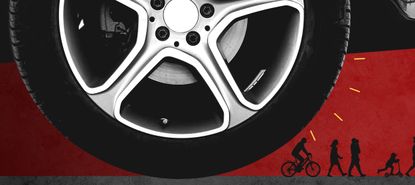Car supremacy and America's traffic paradox
To reduce traffic, set aside road space for non-car travel


Complaining about traffic is practically a national pastime in the United States. With rare exceptions, if you live in a city, from about 7 a.m. to 9 p.m. or so the roads are congested. The latest Urban Mobility Report from the Texas A&M Transportation Institute found that between 1980 and 2017, the number of hours eaten up by congestion for the average auto commuter increased by 270 percent — to 54 hours per year. That's 8.8 billion hours in total, along with 3.3 billion gallons of wasted fuel, for an estimated economic hit of $179 billion.
Luckily, there is a simple and cheap way cities could use their road space more efficiently to cut down traffic: set aside some road space for high-capacity transportation methods like buses and bicycles. America just has to get rid of car supremacy — the idea that private vehicles are the only legitimate way to travel, and that other methods can be accommodated if and only if they don't occupy any space a car might use.
In urban planning, there is an idea called the "Downs-Thomson Paradox," which holds that "the equilibrium speed of car traffic on a road network is determined by the average door-to-door speed of equivalent journeys taken by public transport." In other words, as the Not Just Bikes show explains, "car traffic will get worse and worse and worse until it becomes faster to take the bus or the metro or the tram." When this concept was originally developed decades ago, it was often used as an explanation for the fact that expanding road capacity does not usually reduce traffic. American cities have seen this proved thousands of times — you add a lane to a highway or street, and within a few weeks or months the road is just as jammed as it was before.
Subscribe to The Week
Escape your echo chamber. Get the facts behind the news, plus analysis from multiple perspectives.

Sign up for The Week's Free Newsletters
From our morning news briefing to a weekly Good News Newsletter, get the best of The Week delivered directly to your inbox.
From our morning news briefing to a weekly Good News Newsletter, get the best of The Week delivered directly to your inbox.
Public transit comes into the picture by considering the large population of people who are neutral between transportation options. Some people love cars or trains, of course, and will go out of their way to use them, but many (perhaps most) people just want convenience — whatever option is fastest, that's what they'll take. So if driving becomes faster thanks to a new lane or road, car traffic will simply increase to the point where driving roughly matches the speed of public transit once again. That's the paradox.
It gets worse in American cities because, with few exceptions, public transit consists mostly of buses that get stuck in the same traffic as cars. In my hometown of Philly, for instance, there is a legacy trolley system that partially escaped the 20th-century effort to destroy similar systems across the country. But on the surface streets, the trolleys are in traffic, and so they are slow (though once they get underground, speed accelerates dramatically). In this situation, the paradox is reinforced by eliminating the possibility that public transit can ever move faster than car traffic.
A Census Bureau study on commute lengths from 2017 found fairly reasonable commute times for most American cities, at 26 minutes on average (fairly close to the European figure). But commute times on public transit were much, much worse — more than twice as long as car commutes in almost every state, and nearly three times as long in Connecticut, Nevada, and Idaho. In most American cities, public transit is an underfunded, neglected system used almost entirely by people too poor to own a car, who pay a massive time penalty as a result.
It's a depressing statement about how utterly dependent America is on cars.
However, the paradox also works in the opposite direction. If you increase the viability of non-car transportation options by speeding them up, then fewer people will drive, and traffic will be reduced. People who just want to get from point A to point B will pick the quicker option, and there will be fewer cars on the road — thus reducing traffic congestion, and making car trips quicker too.
Now, many American cities are not very well-suited to forms of mass transit like subways, because they have such low density. But as Jack Ross argues at Capital and Main, buses are still viable in such places because they are so cheap. All that is needed is to set aside some road space just for buses, which can be further improved by setting up boarding platforms and giving them priority through intersections (often called bus rapid transit). If buses don't get stuck in traffic, they can beat the cars to their destination, while carrying on the order of five times as many people in the same space.
Similarly, bike commuting would be easily viable in many American cities — especially with the rise of e-bikes, which make riding easy and comfortable even for people in business attire. But few people do so because cycling is so dangerous and uncomfortable here. Even in purportedly bike-friendly U.S. cities, the typical bike lane is a painted gutter in between the car traffic and parking — which means drivers constantly wander into them or use them as illegal parking, and cyclists are at risk of getting doored. Cyclist protests or vigils over some poor person who got smashed by an inattentive (or murderous) driver are depressingly routine.
Cities like Amsterdam and Copenhagen show the way to have safe cycling is to provide a dedicated space: protected bike lanes free of cars, routed around the city so that a cyclist can get fairly close to their destination without leaving them. Once cyclists don't have to fear getting flattened, many more will do it. A bikeway has similar capacity as a dedicated bus lane, and is even cheaper to build.
There are any number of reasons why American cities should become more transit-, bike-, and pedestrian-friendly — it would be healthier and more energy-efficient, create less pollution, and above all cut down on traffic injuries and deaths. But for my purposes here the key point is that doing so is also better even for drivers. By simply removing cars from a few streets and lanes so that buses don't get stuck in traffic, and so that cycling isn't hellishly risky, the overall throughput of the road network is drastically increased. Everyone wins.
Unfortunately, this will take a revolution in attitudes and city planning. Car supremacy saturates every part of American urban politics — bus and bike infrastructure are an afterthought in planning discussions if they are considered at all, and drivers typically regard being banned from any road space with screaming outrage, like it's some insult to their personal identity. Even tiny steps like a single dedicated busway in New York City saw some protests. But if city residents can come to realize that some car-free streets will actually cut traffic by getting people out of their cars and letting the roads breathe, Americans would save a great deal of time, and our cities would be much more pleasant.
Create an account with the same email registered to your subscription to unlock access.
Sign up for Today's Best Articles in your inbox
A free daily email with the biggest news stories of the day – and the best features from TheWeek.com
Ryan Cooper is a national correspondent at TheWeek.com. His work has appeared in the Washington Monthly, The New Republic, and the Washington Post.
-
 Justices set to punt on Trump immunity case
Justices set to punt on Trump immunity caseSpeed Read Conservative justices signaled support for Trump's protection from criminal charges
By Peter Weber, The Week US Published
-
 Do youth curfews work?
Do youth curfews work?Today's big question Banning unaccompanied children from towns and cities is popular with some voters but is contentious politically
By Harriet Marsden, The Week UK Published
-
 'Sleaze baack!'
'Sleaze baack!'Today's Newspapers A roundup of the headlines from the US front pages
By The Week Staff Published
-
 Arizona court reinstates 1864 abortion ban
Arizona court reinstates 1864 abortion banSpeed Read The law makes all abortions illegal in the state except to save the mother's life
By Rafi Schwartz, The Week US Published
-
 Trump, billions richer, is selling Bibles
Trump, billions richer, is selling BiblesSpeed Read The former president is hawking a $60 "God Bless the USA Bible"
By Peter Weber, The Week US Published
-
 The debate about Biden's age and mental fitness
The debate about Biden's age and mental fitnessIn Depth Some critics argue Biden is too old to run again. Does the argument have merit?
By Grayson Quay Published
-
 How would a second Trump presidency affect Britain?
How would a second Trump presidency affect Britain?Today's Big Question Re-election of Republican frontrunner could threaten UK security, warns former head of secret service
By Harriet Marsden, The Week UK Published
-
 'Rwanda plan is less a deterrent and more a bluff'
'Rwanda plan is less a deterrent and more a bluff'Instant Opinion Opinion, comment and editorials of the day
By The Week UK Published
-
 Henry Kissinger dies aged 100: a complicated legacy?
Henry Kissinger dies aged 100: a complicated legacy?Talking Point Top US diplomat and Nobel Peace Prize winner remembered as both foreign policy genius and war criminal
By Harriet Marsden, The Week UK Last updated
-
 Trump’s rhetoric: a shift to 'straight-up Nazi talk'
Trump’s rhetoric: a shift to 'straight-up Nazi talk'Why everyone's talking about Would-be president's sinister language is backed by an incendiary policy agenda, say commentators
By The Week UK Published
-
 More covfefe: is the world ready for a second Donald Trump presidency?
More covfefe: is the world ready for a second Donald Trump presidency?Today's Big Question Republican's re-election would be a 'nightmare' scenario for Europe, Ukraine and the West
By Sorcha Bradley, The Week UK Published